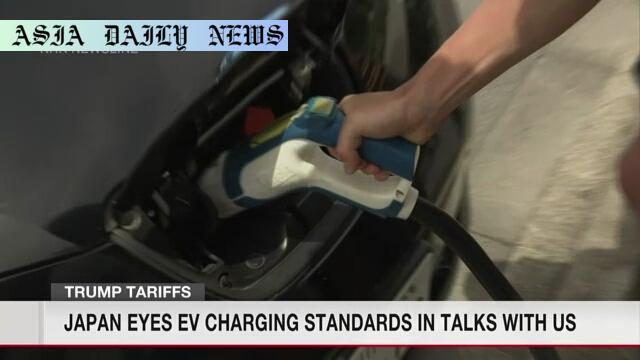EV charging standards may be under review as Japan evaluates its CHAdeMO system compatibility to address U.S. trade concerns.

Japan’s Exploration of EV Charging Standards
As the global shift towards sustainable mobility accelerates, Japan finds itself at a crossroads regarding its electric vehicle (EV) charging standards. Following remarks from Japan’s trade minister, Muto Yoji, it has become clear that the country is preparing to assess its CHAdeMO charging system and how it aligns with international standards, particularly with the U.S. market. This move stems from concerns raised by the U.S. that Japan’s subsidies and adherence to the CHAdeMO system create non-tariff barriers, impeding the access of American automakers to the Japanese market.
Japan’s CHAdeMO standard, which is widely used domestically for fast-charging EVs, has been a topic of contention during dialogues between Japan and the U.S. The U.S., during the Trump administration and beyond, has expressed dissatisfaction with the limited compatibility of U.S. EVs in Japan. Muto noted that U.S. vehicles can currently use adapters to charge in Japan, but the extra steps required might pose a significant inconvenience.
Energy experts and policymakers speculate that revisiting or modernizing Japan’s EV infrastructure could allow for greater compatibility with international systems like CCS (Combined Charging System), which dominates the U.S. and European markets. Such revisions could mark an important step toward alleviating trade tensions and bolstering economic collaborations.
CHAdeMO Standards under Scrutiny
The CHAdeMO system has long been a staple in the Japanese EV ecosystem, offering efficient and standardized charging solutions for manufacturers and consumers alike. However, Washington has criticized it as a restrictive mechanism that serves as a “non-tariff barrier” against foreign automakers. Subsidy frameworks promoting this standard have added fuel to the fire, raising concerns about Japan’s ability to foster equal growth for global automakers operating within its borders.
Observers suggest that the CHAdeMO system is losing favor on the global stage, especially as more countries and automakers adopt CCS as the new universal benchmark. While CHAdeMO remains prevalent in Asia, its narrow acceptance globally could hinder Japan’s EV ambitions. Redefining the country’s standards—or working toward interoperability—could help Japan strengthen partnerships and address critiques head-on.
Trade Negotiations and Economic Impact
Trade negotiations between Japan and the U.S. are expected to intensify as both countries navigate longstanding economic tensions. The U.S. Trade Representative’s office has already cited Japan’s EV subsidies as a potential area of contention, echoing sentiments that limited compatibility undermines broader trade cooperation. President Trump voiced similar frustrations, noting the absence of American cars on Japanese roads, which he attributed partly to perceived trade disadvantages.
An overhaul of charging system policies could pave the way for new opportunities for U.S. automakers. Moreover, harmonizing charging standards could stimulate innovation, investment, and competition in Japan’s rapidly growing EV market. Japan stands to benefit from reduced trade friction while reaffirming its commitment to environmental sustainability and fostering stronger ties with allied nations.
Looking Ahead
Japan’s willingness to reconsider its EV charging standards represents a significant shift in its approach to international trade policy. This decision reflects broader trends in the automotive industry, where interoperability and global standards are becoming increasingly critical. If Japan can navigate these changes effectively, it has the potential to emerge as a leader in sustainable mobility while accommodating the interests of international players.
In conclusion, this debate over EV charging infrastructure is about more than just technology—it is a window into the evolving relationship between economic policy and shared global ambitions for a greener future. For Japan, the road ahead may be challenging, but it also offers an opportunity to reinforce its position on the global stage as a forward-thinking innovator and collaborator.
Commentary
The Importance of Revisiting EV Standards
The ongoing focus by Japan on its EV charging standards is both timely and pivotal for the future of the global automotive market. It highlights a growing demand for cross-border compatibility, ensuring that infrastructure development is inclusive and adaptable to technological advancements. The CHAdeMO system has served Japan well for a decade, but as global preferences shift toward more widely adapted solutions like CCS, Japan’s proactive review of these standards indicates a bold recognition of the need for evolution.
Economic And Environmental Linkages
Evaluating Japan’s EV infrastructure is not merely an economic exercise; it is a step toward strengthening environmental commitments and fostering global collaboration. Trade barriers, whether tariff or non-tariff, can slow progress in achieving crucial climate goals, particularly when they limit the open exchange of technologies and innovations. Japan’s willingness to explore compromises and rethink existing systems demonstrates the nation’s intent to balance its competitiveness with global sustainability efforts.
Path Toward Greater Trade Synergies
One cannot ignore the geopolitical dynamics at play here. Japan’s relationship with the U.S., particularly in the context of trade negotiations, is integral to resolving evolving disputes and maintaining trust. Addressing U.S. concerns, particularly in light of President Trump’s critique of American cars on Japanese roads, offers an opportunity for Japan to present itself as a flexible and forward-thinking trade partner. By setting a precedent for cooperation, Japan could inspire other nations to prioritize accessibility and modernization in future sustainability projects.
Ultimately, Japan’s focus on revisiting EV charging infrastructure signifies an opportunity for progress on multiple fronts: diplomacy, technological advancement, and environmental stewardship. Policymakers must strike a balance to create positive outcomes for all stakeholders, paving the way for a future marked by collaboration and innovation.


